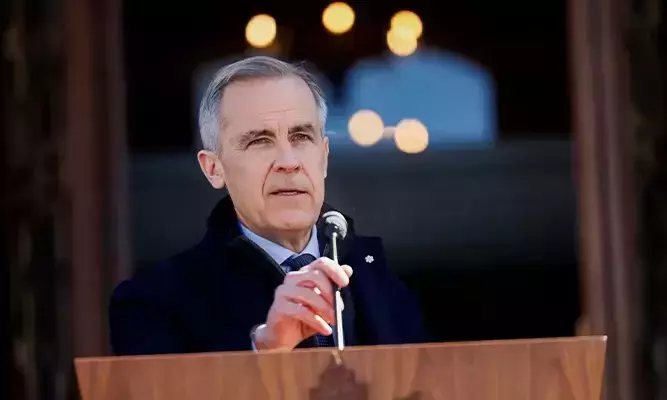In a bold political maneuver, Canada’s newly appointed Prime Minister, Mark Carney, has called for a snap federal election to be held on April 28, 2025. This decision comes less than two weeks after Carney assumed office, succeeding Justin Trudeau. The impetus for this abrupt move is the escalating trade tensions with the United States, marked by President Donald Trump’s imposition of steep tariffs and provocative rhetoric suggesting the annexation of Canada as the 51st state.
Escalating Trade Tensions
The trade dispute intensified earlier this month when President Trump imposed a 25% tariff on Canadian steel and aluminum imports, exacerbating economic strains between the two nations. Trump’s administration has also threatened broader tariffs on a wide array of Canadian goods, further destabilizing the historically robust trade relationship. In a move that has alarmed Canadian officials and citizens alike, Trump has alluded to plans to incorporate Canada into the United States, a notion that has been met with widespread indignation across the political spectrum in Canada.
Carney’s Call to Action
In response to these unprecedented challenges, Prime Minister Carney has emphasized the necessity of obtaining a strong mandate from the Canadian electorate to effectively counter the external threats posed by the U.S. administration. During a press conference in Ottawa, Carney described the situation as “the most significant crisis of our lifetimes,” underscoring the urgency of a united national front to protect Canada’s sovereignty and economic interests.
Carney, a former central banker with a reputation for adept crisis management, has outlined a comprehensive strategy to navigate the nation through these turbulent times. His plan includes diversifying trade partnerships to reduce economic dependence on the United States, investing in domestic industries to bolster economic resilience, and enhancing defense capabilities to safeguard national sovereignty. Additionally, Carney has proposed measures to support sectors adversely affected by U.S. tariffs, including targeted assistance for industries such as steel, aluminum, and agriculture.
Political Landscape and Opposition
The announcement of the snap election has significantly altered the Canadian political landscape. Prior to the trade dispute, the Conservative Party, led by Pierre Poilievre, held a substantial lead in the polls, buoyed by public dissatisfaction with the previous Liberal administration. However, the escalation of tensions with the United States has galvanized nationalistic sentiments among Canadians, leading to a surge in support for Carney and the Liberal Party. Recent polls indicate a narrowing gap between the two major parties, with the Liberals gaining momentum as the election approaches.
Poilievre, known for his populist rhetoric and criticism of government policies, now faces the challenge of recalibrating his campaign to address the evolving priorities of the electorate. He has accused Carney of being part of the establishment and has criticized the Liberal Party’s handling of domestic issues such as inflation, housing, and immigration. However, Poilievre’s stance on the U.S. administration’s actions has been perceived as tepid, leading to questions about his ability to effectively defend Canada’s interests on the international stage.
National Sentiment and Economic Implications
The U.S. tariffs have had a tangible impact on the Canadian economy, particularly in industries directly targeted by the measures. The steel and aluminum sectors have reported decreased exports and financial losses, prompting concerns about job security and economic stability in affected regions. In response, Carney has pledged to implement support measures, including financial aid and tax relief, to mitigate the adverse effects on Canadian businesses and workers.
The broader economic implications of the trade dispute have also become a focal point of public discourse. Analysts warn that prolonged tensions could lead to increased consumer prices, supply chain disruptions, and a slowdown in economic growth. These concerns have heightened the stakes of the upcoming election, as voters consider the economic stewardship capabilities of the competing parties.
International Reactions
The international community has been closely monitoring the developments between Canada and the United States. Allies of Canada have expressed support for Carney’s stance against U.S. aggression, emphasizing the importance of upholding international trade norms and respecting national sovereignty. European Union officials, in particular, have condemned the U.S. tariffs and have signaled a willingness to strengthen economic ties with Canada as a countermeasure to U.S. protectionism.
As Canada approaches the April 28 election, the nation stands at a critical juncture. The outcome will not only determine the domestic policy direction but also define Canada’s approach to navigating external challenges posed by an increasingly adversarial U.S. administration. Prime Minister Carney’s call for a snap election reflects a strategic effort to consolidate political support and fortify the country’s resolve in defending its sovereignty and economic well-being. The election campaign is expected to be intensely contested, with issues of national identity, economic resilience, and international diplomacy at the forefront of voters’ minds.




